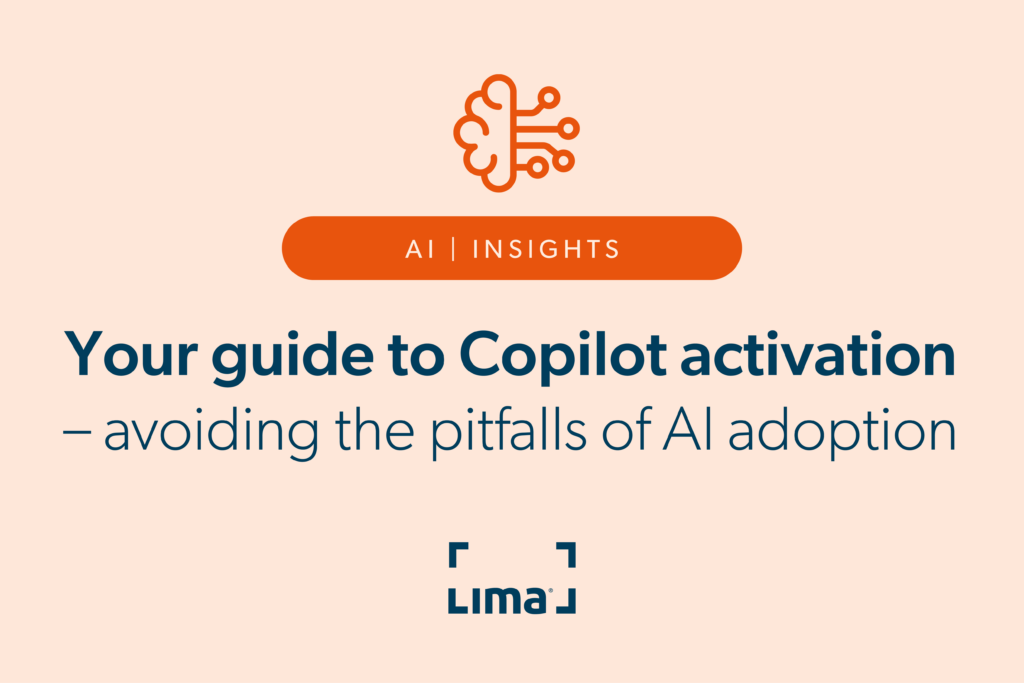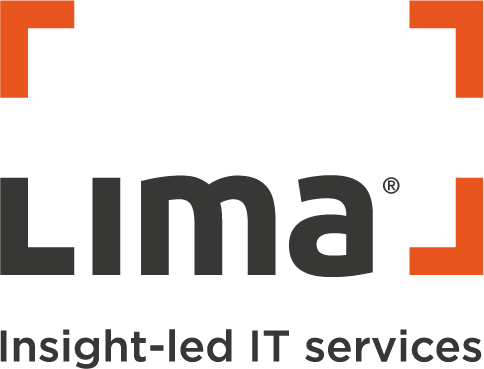
Navigator Tissue UK Chooses LIMA To Streamline IT Operations and Bolster Cybersecurity
03.10.24
Five takeaways from LIMA Elevate
19.11.24
Is your organisation prepared to realise the opportunity of AI?
Copilot is Microsoft’s AI-powered assistant, designed to transform the way we work.
It helps users navigate complex tasks, streamline workflows, and enhance overall productivity. By integrating seamlessly with Microsoft 365, Copilot brings a new level of intelligence to familiar tools like Word, Excel, PowerPoint, Teams and Outlook.
With the right approach, you and your team will soon be automating routine tasks and receiving intelligent suggestions that make you more efficient and creative.
But first it’s important to lay the groundwork ahead of Copilot activation, and a recent admin change made by Microsoft could be a bump in your road to AI adoption before you’ve even begun!
Recent admin changes to Copilot
Microsoft recently made changes it to its Microsoft 365 service allowing end users to purchase the Copilot service (self-serve) on an individual user basis. This self-serve setting is now enabled by default, so unless you’ve turned it off users can now enable Copilot within your organisation’s 365 platform.
LIMA experts recommend that admins disable self-serve purchasing immediately. We’ve already made this recommendation to all of our customers directly, as a responsible Managed Service Provider.
Without proper management, users could inadvertently open up data privacy and security issues by connecting Copilot to your organisation’s entire 365 environment without sufficient safeguards in place.
How to disable self-serve in your 365 environment
Your Global Administrator can use the Microsoft 365 admin centre to manage self-service purchases and trials for users in your organisation.
- In the Microsoft 365 admin centre, go to the Settings > Org settings page.
- On the Services tab of the Org settings page, select Self-service trials and purchases.
- The Self-service trials and purchases page lists the products that are eligible for self-service, and shows their current self-service setting.
- To manage the settings for a specific product, select the product name. A panel opens and shows the current setting for the product you selected.
- To change the setting for the product, select Allow, Allow for trials only, or Do not allow.
- Select Save changes.
What are the risks of enabling Copilot without doing the groundwork?
At LIMA we are incredibly excited about the opportunities Copilot offers to supercharge your organisation’s efficiency, but there is groundwork and internal education required to deliver Copilot securely.
Your organisation generates huge amounts of content and data, which Copilot could make much more valuable. But with great power comes great responsibility, and without proper management in the age of AI, this data can suddenly be opened up to loss or misuse.
Incorrect setup or configuration of AI systems can lead to data being improperly stored or transmitted, increasing the risk of data loss. What’s more, AI systems that continuously learn and update their models could overwrite existing data, leading to loss of historical data if not properly backed up.
Here are some important questions to start thinking about before you hand over the Copilot keys to enthusiastic employees!
1. Data Management
Is your existing data and documentation well labelled and organised so that only relevant, approved documents appear as results in Copilot?
Have you reviewed what data is in scope for Copilot? Have you removed or anonymised confidential or sensitive information?
How do you control and review security permissions for data within SharePoint? Do you have role-based access across all documents?
What are your data loss prevention policies?
2. Organisational Readiness
What is your business strategy for Copilot? Who in the organisation will use it and what for?
Have you got the policies in place internally to ensure the safe consumption of Copilot by your end users?
Have you considered what training you might put in place to ensure your users are using Copilot safely, while maximising its benefits?
Have you got the skills in house to securely manage Copilot? Research from Kaspersky shows that four-in-ten cybersecurity teams are understaffed, and recruitment lead times are long, with just 6% of vacant senior security roles filled within three months of advertisement. If you don’t have the skills or resources in house, consider working with a partner who can protect and manage your environment for you, giving you peace of mind.
3. Monitoring
Have you got a plan in place for monitoring the use of Copilot in your organisation? Having robust monitoring can help you to land Copilot effectively and securely.
Performance tracking: Performance monitoring helps you track how well Copilot is performing. This includes response times, accuracy, and user satisfaction. By keeping an eye on these metrics, you can ensure Copilot is meeting your organisation’s expectations and identify areas for improvement.
Issue detection: Early detection of issues such as bugs, errors, or unexpected behaviour is vital. Monitoring allows you to catch these problems quickly, minimising downtime and ensuring a smooth user experience.
Security: Security monitoring helps in identifying any potential security threats or breaches. By looking out for unusual activity, you can protect sensitive data and maintain the integrity of your systems.
Compliance: Many industries have strict compliance requirements. Monitoring ensures that your use of Copilot adheres to these regulations, helping you avoid legal issues and maintain trust with your stakeholders.
Resource management: Effective monitoring helps you to manage resources efficiently. You can track usage patterns and allocate resources where they are needed most, optimising performance and cost-effectiveness.
Need help getting your organisation AI ready?
Join us in Manchester on Thursday 14th November for Elevate. At this FREE event, experts from LIMA and Microsoft partner Westcoast will unpack Copilot and its benefits, and the team from LIMA will share lessons from our own AI adoption journey.


